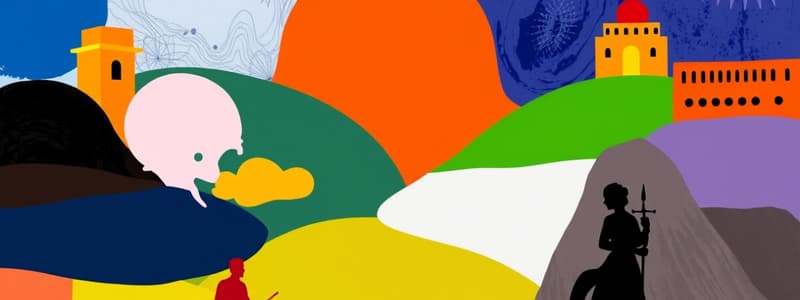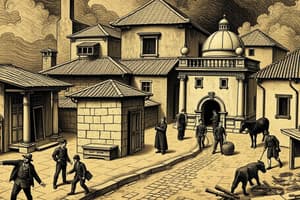Podcast
Questions and Answers
What is history and why is it important?
What is history and why is it important?
History is the study of past events, especially in human affairs, and it is important for understanding cultural heritage and learning from past mistakes.
Name one major development in ancient history and its significance.
Name one major development in ancient history and its significance.
The development of writing was significant as it enabled the recording of events and preservation of knowledge.
How did the Renaissance contribute to European culture?
How did the Renaissance contribute to European culture?
The Renaissance contributed to European culture by reviving art and science, emphasizing humanism and exploration.
What characterizes the Middle Ages in terms of political structure?
What characterizes the Middle Ages in terms of political structure?
Describe the impact of the Industrial Revolution on society.
Describe the impact of the Industrial Revolution on society.
What role did primary sources play in historical research?
What role did primary sources play in historical research?
Identify one key theme in history and explain its relevance.
Identify one key theme in history and explain its relevance.
Who was Alexander the Great and what was his historical significance?
Who was Alexander the Great and what was his historical significance?
Flashcards are hidden until you start studying
Study Notes
Key Concepts in History
-
Definition of History: The study of past events, particularly in human affairs.
-
Importance of History:
- Understanding cultural heritage.
- Learning from past mistakes.
- Contextualizing current events.
Major Periods in History
-
Prehistory:
- Time before written records.
- Includes the Stone Age, Bronze Age, Iron Age.
-
Ancient History:
- Civilizations such as Mesopotamia, Ancient Egypt, Indus Valley, and China.
- Development of writing, agriculture, and urbanization.
-
Classical Antiquity:
- Rise of empires (Greece, Rome).
- Philosophical advancements (Socrates, Plato, Aristotle).
-
Middle Ages:
- Feudalism in Europe.
- The spread of Islam and the Byzantine Empire.
- The Crusades and their impacts.
-
Renaissance:
- Rebirth of art, culture, and science in Europe.
- Key figures include Leonardo da Vinci and Michelangelo.
- Humanism and exploration (Columbus, Magellan).
-
Modern History:
- Enlightenment and revolutions (American, French).
- Industrial Revolution and its effects on society.
- World Wars and their global impact.
-
Contemporary History:
- Post-World War II developments.
- The Cold War and decolonization.
- Technological advancements and globalization.
Historical Methods
- Primary Sources: Original documents, artifacts, and firsthand accounts.
- Secondary Sources: Analyses, interpretations, and summaries of primary sources.
- Historiography: The study of how history is written and interpreted.
Key Historical Themes
- Politics and Power: Governance, revolutions, and political ideologies.
- Economics: Trade, industry, and economic systems (capitalism, socialism).
- Society and Culture: Religion, gender roles, and social movements.
- Conflict and War: Causes, events, and consequences of wars.
Important Historical Figures
- Alexander the Great: Conqueror who created one of the largest empires.
- Julius Caesar: Key figure in the transition from Roman Republic to Empire.
- Genghis Khan: Founder of the Mongol Empire, known for military conquests.
- Mahatma Gandhi: Leader of the Indian independence movement.
Influences on History
- Geography: Impact on trade, migration, and cultural exchange.
- Technology: Role in warfare, communication, and industry.
- Religion: Influences on culture, law, and society.
Tips for Studying History
- Create timelines to visualize events.
- Compare different historical interpretations.
- Focus on cause and effect relationships.
- Engage with diverse sources for a well-rounded perspective.
Definition and Importance of History
- History examines past events, especially human interactions and societies.
- Understanding cultural heritage fosters identity and continuity.
- Learning from historical mistakes aids in preventing future errors.
- Contextualizing current events enhances comprehension of contemporary issues.
Major Periods in History
- Prehistory: Encompasses the Stone Age, Bronze Age, and Iron Age, characterized by the absence of written records.
- Ancient History: Features significant civilizations like Mesopotamia, Ancient Egypt, Indus Valley, and China; notable for the inventions of writing, agriculture, and urban centers.
- Classical Antiquity: Marked by the rise of empires such as Greece and Rome; notable philosophical advancements by thinkers like Socrates, Plato, and Aristotle.
- Middle Ages: Defined by feudalism in Europe, the expansion of Islam, and the Byzantine Empire; significant events include the Crusades with their lasting impacts.
- Renaissance: A period of renewed interest in art, culture, and science; prominent figures include Leonardo da Vinci and Michelangelo, with a focus on humanism and exploration initiatives by Columbus and Magellan.
- Modern History: Covers the Enlightenment and revolutions (American and French); the Industrial Revolution transformed society, leading into the global ramifications of the World Wars.
- Contemporary History: Comprises post-World War II developments, the dynamics of the Cold War, decolonization movements, and rapid technological advancements impacting globalization.
Historical Methods
- Primary Sources: Original materials such as documents, artifacts, and first-hand accounts provide direct evidence of historical events.
- Secondary Sources: Analyses and interpretations of primary sources help contextualize and understand historical narratives.
- Historiography: Refers to the study of various methodologies and perspectives that shape the writing and interpretation of history.
Key Historical Themes
- Politics and Power: Examines governance systems, revolutions, and the evolution of political ideologies.
- Economics: Investigates trade, industrialization, and economic frameworks like capitalism and socialism.
- Society and Culture: Analyzes religion, gender dynamics, and social movements affecting human experiences.
- Conflict and War: Explores the causes, significant events, and consequences associated with warfare.
Important Historical Figures
- Alexander the Great: Renowned for establishing one of history's largest empires through conquests.
- Julius Caesar: Central to the decline of the Roman Republic and the rise of the Roman Empire.
- Genghis Khan: Known for founding the Mongol Empire, greatly influencing Eurasian history through military expansion.
- Mahatma Gandhi: Key leader in India's struggle for independence, advocating for nonviolent resistance.
Influences on History
- Geography: Shapes trade routes, migration patterns, and cultural exchanges across societies.
- Technology: Transforms warfare, communication systems, and industrial processes, playing a pivotal role in shaping historical outcomes.
- Religion: Influences laws, cultural practices, and social structures, deeply embedding in various historical narratives.
Tips for Studying History
- Develop timelines to visualize chronological events and their interrelations.
- Analyze diverse historical interpretations to understand different perspectives.
- Emphasize cause and effect relationships to comprehend the implications of historical events.
- Engage with an array of sources, including primary, secondary, and varied interpretations to gain a comprehensive overview.
Studying That Suits You
Use AI to generate personalized quizzes and flashcards to suit your learning preferences.




